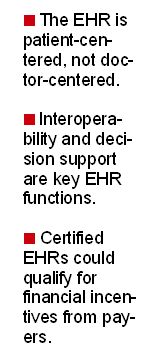Article
Technology Consult
EMR or EHR?

In case you haven't noticed, the world of healthcare computing has come down with a bad case of name-calling. Over the past few years, roughly two-dozen terms have surfaced to describe a computerized version of the paper chart. Digital patient chart, computerized medical record, virtual health record, cyber patient file-the synonyms gleefully rearrange themselves like pictures of fruit on a slot machine.
Software vendors, journalists, and academics contribute to the confusion, as do industry groups. While the dominant term these days is EMR, the leading trade show for clinical software is called TEPR-Towards an Electronic Patient Record. Go figure. Or rather, go compute.
The big difference between EMR and EHR, say EHR proponents, lies in the implications of the word "health." "Med-ical," they say, conjures up patient information stored in a physician's stand-alone computer. But in its ideal form, an electronic health record encompasses data in the computer systems of all healthcare organizations or providers who care for a patient, be they hospitals, physical therapists, pharmacists, or consulting physicians. Because these systems are connected, the patient and his caregivers can access the EHR, and add to it. In short, the EHR is patient-centered and transcends the doctor's office.
The sea change in terminology began in earnest last year, when Health and Human Services Secretary Tommy Thompson, eager to see the healthcare field go paperless, commissioned the Institute of Med-icine to create a standardized model of the EHR. The resulting IOM report stated that an EHR system should consist of eight core functions:
Health information and data. The system holds what's normally in a paper chart-problem lists, medication lists, test results.
Results management. An EHR lets you receive lab results, radiology reports, and even X-ray images electronically.
Order entry. No more prescription pads. All your orders are automated.
Decision support. An EHR is smart enough to warn you about drug interactions, help you make a diagnosis, and point you to evidence-based guidelines when you ponder treatment options.
Electronic communications and connectivity. You can talk in cyberspace with patients, your medical assistant, referring doctors, hospitals, and insurers-securely. And your system interfaces with everyone else's. Interoperability is the key word.
Patient support. Patients can receive educational material via the EHR and enter data themselves through online questionnaires and home monitoring devices.
Administrative processes. The system lends a hand with practice management. Patients can schedule their own appointments and staffers can check on insurance eligibility.
Reporting and population health management. How many patients did you treat for tuberculosis in 2003? How many of your diabetics have their HbA1c under 7? An EHR will spit out the answers, thanks to a searchable database.





